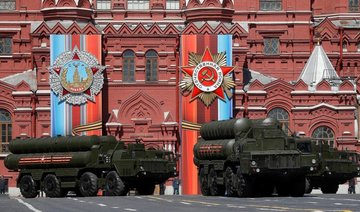ANKARA: The US announced it was formally removing Turkey from its F-35 fighter jet program on Wednesday, following the delivery of the first part of a Russian S-400 missile defense system to Ankara.
“F-35 cannot coexist with a Russian intelligence collection platform that will be used to learn about its advanced capabilities,” the Pentagon said in a statement, adding that the removal would be completed by March 2020.
Ankara, which has been cultivating closer ties with Moscow on defense procurement, had invested in the F-35 program, with Turkish defense companies producing 937 parts of the plane, and 100 of the jets expected to be bought by the Turkish military.
To fill the vacuum created by Turkey’s removal from the program, Russian Deputy Prime Minister Yuri Borisov announced that Russia was ready to sell combat aircraft to Ankara.
Dr. Can Kasapoglu, a defense analyst at the Centre for Economics and Foreign Policy, an Istanbul-based think tank, said the F-35 and the S-400 were mutually exclusive defense acquisitions, not only technically but also politically, and that this had been a very well-known fact for a long time.
“Militarily, it means that Turkey is cut off from a state-of-the-art fifth generation combat aircraft project that fits perfectly for network-centric warfare and gaining information superiority in the complex battle spaces of the 21st century,” he told Arab News.
“Although many in Turkey talk about ‘alternatives’ like the Russian Su-57, for now, there is no tangible ground for any co-production or tech-transfer ventures. Besides, the F-35 is an information-superiority asset and a situational awareness node. The Russian military aviation prioritizes very different features such as super-maneuverability and kinematic edge. These are completely distinct design philosophies.”
There are now questions over whether or not Washington will bring Countering America’s Adversaries Through Sanctions Act (CAATSA ) sanctions against Turkey over its decision to purchase the Russian missile system.
“One should grasp the content of the CAATSA sanctions spectrum. There are some harmless articles such as cutting off the sanctioned entities from US export-import loans. Yet, if the US opted for following the Chinese precedent, namely sanctioning Turkey’s main procurement body, then Turkey could face hard times in its defense transactions,” Kasapoglu said.
US Deputy Undersecretary of Defense David J. Trachtenberg told reporters at the Pentagon: “The US greatly values our strategic relationship with Turkey — that remains unchanged.
“As long-standing NATO allies, our relationship is multilayered and extends well beyond the F-35 partnership. We will continue our extensive cooperation with Turkey across the entire spectrum of our relationship.”
However, for Kasapoglu, it is a lose-lose situation for Turkish-US ties, while the ultimate geopolitical victor is Russian President Vladimir Putin.
“He knows what he is doing, and there is no match for the Kremlin’s strategic calculus in the West. It is another unfortunate cold fact for the transatlantic strategic community. The S-400 has managed to do this without firing one single interceptor,” he said.
Aaron Stein, director of the Middle East program at the US-based Foreign Policy Research Institute, thinks the negative repercussions of the S-400 have only just started and that the US-Turkish relationship may worsen.
“Even with the F-35, CAATSA looms, and it is almost certain sanctions will be implemented,” he told Arab News.
“Turkey has lost the aircraft it intended to build its future air force around. There is no real way Ankara can address this issue, other than to try and finish building its own fighter, a tremendously expensive endeavor dependent on foreign engines, or purchase aircraft from Moscow.”
In a press release the Turkish Ministry of Foreign Affairs stated: “This unilateral step contradicts the spirit of alliance and does not rely on any legitimate justification,” and criticized Washington for leaving unanswered its proposal to form a working group on the issue.


















